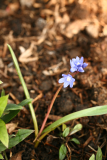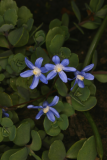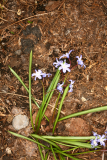Additional notes (click to expand)
Nomenclature
Previously grown as Chinodoxa sardensis
http://www.plantsoftheworldonline.org/
Toxicity
Many Scilla contain poisonous steroidal saponins. Drimia maritima (Sea Squill) was used in the late medieval /early modern era for treating 'oedema', but no record of use of Chionodoxa.
All parts of the plant are highly toxic because they contain bufadienolide cardiac glycosides., such as Scillarenin. They may cause cardiac dysfunction as well as vomiting and diarrhoea. Evans (2009) in Trease and Evans Pharmacognosy.
Professor Anthony Dayan, 2022
Geographical distribution
- Asia-Temperate, Western Asia, Turkey
Scilla sardensis (Whittall ex Barr & Sugden) Speta
Family: ASPARAGACEAEGenus: Scilla
Species: sardensis (Whittall ex Barr & Sugden) Speta
Common names: Squill from Sart
Distribution summary: Turkey
Habit: Bulbous
Hardiness: H6 - Hardy; very cold winter
Habitat: Dry grassland, scrub, meadows, open woodland, roadsides
Garden status: Currently grown
Garden location: Plants of the World (C)
Flowering months: March, April
Reason for growing: Toxic
.jpg)
.jpg)
.JPG)


